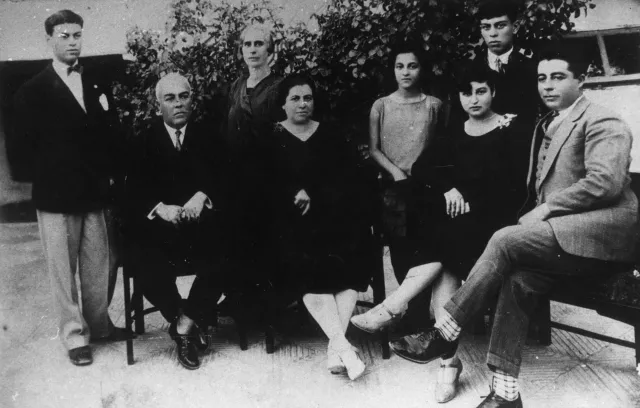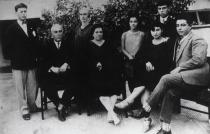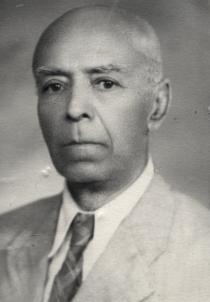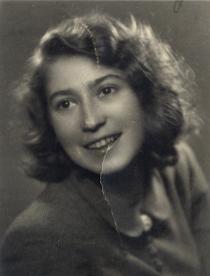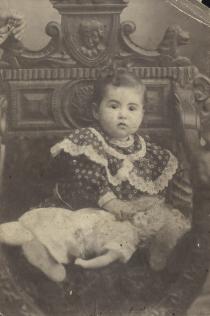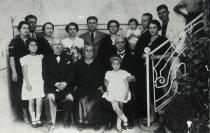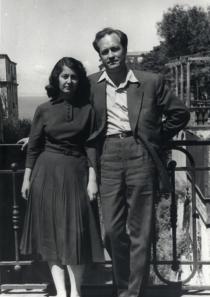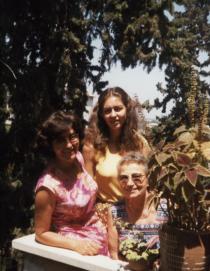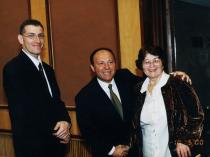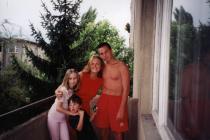Rosa Kolevska's family
This is a family photo taken in Sliven on the occasion of my mother Berta Meshulam Aroyo's engagement. My father David Yako Cohen and my mother are sitting on the far right. Next to them sitting are my grandmother Evgenia Solomon Aroyo, nee Behar, and my grandfather Meshulam Aroyo, my mother's parents. First from left are my uncle Elia Aroyo, my mother's brother, my aunt Matilda Danon, nee Aroyo, my mother's sister. Behind is my grandfather is Perla Aroyo, my grandfather Meshulam Aroyo's sister. First from left is Israel, my mother's brother.
Before my parents got married, my mother's relatives had introduced her to some other 'candidates'. She was very beautiful! People used to call her 'Pretty Berta'. They arranged a meeting for her with a Romanian, but he wanted a very big dowry, which her parents couldn't provide. Later they also arranged other meetings. Finally she was introduced to my father. That's how they got married, without having a romantic relationship, but they both fell for each other instantly. They had a religious marriage, as was common for all Jews at that time.
My mother was born in Sliven in 1907. She studied in the Jewish school, which existed back then in Sliven, till the secondary school. Later she went to study in Rousse, in a Catholic college. She studied there for two years, and after that she returned to Sliven where she finished a Bulgarian school. She spoke French. She had learned it very quickly. Her father obliged her to write letters to him only in French, when she was a schoolgirl in Rousse. I have even seen such letters, written by mother in a very impressive handwriting. She spoke the language so brilliantly that almost 40 years later, in 1964, it happened so that some friends of ours from France visited us and they were really very impressed by her perfect French, which she hadn't spoken for many years. She was very clever, very studious. Sometimes she translated some articles for WIZO, but otherwise she wasn't an activist in such organizations. She was a good housewife and a good mother. My father was quite a harsh man and my mother never had access to money. He used to buy everything, and the money he gave to her was always under control. Actually I didn't know my mother well as a child. I got to know her only when my father died in 1942.
My father was born in Aytos in 1898. I don't know what kind of education he had. He started working at a very early age. He was a very strict man and I was afraid of him. He never beat me, but every time he raised his voice, I was dying of fear. Actually I didn't know him. Now I realize that at the time of his death he was in fact quite a young man - only 44 years old. His friends were mostly Bulgarians: a watchmaker, a factory-owner, and a furniture manufacturer. My father was a very worldly person. He wasn't religious, but he insisted on all of us being at home for dinner. He never stayed in the tavern like most Bulgarians used to do. There were several Bulgarian families, with whom we kept very close friendly relations. We even taught them several Spanish words. My father had a shop in Sliven, which he actually rented. We never owned anything. He used to sell maize and flour. He was a representative of the Big Bulgarian Mills [co-operation]. We were neither poor, nor rich. My father didn't work alone in that shop. I remember, for example, that there was a Turk, a carter, who used to help him. There were other representatives of the Bulgarian Mills in the town too; he wasn't the only one. My father was the soul of all the Jewish holidays we celebrated at home. He wasn't religious and we didn't even speak Ladino at home.
